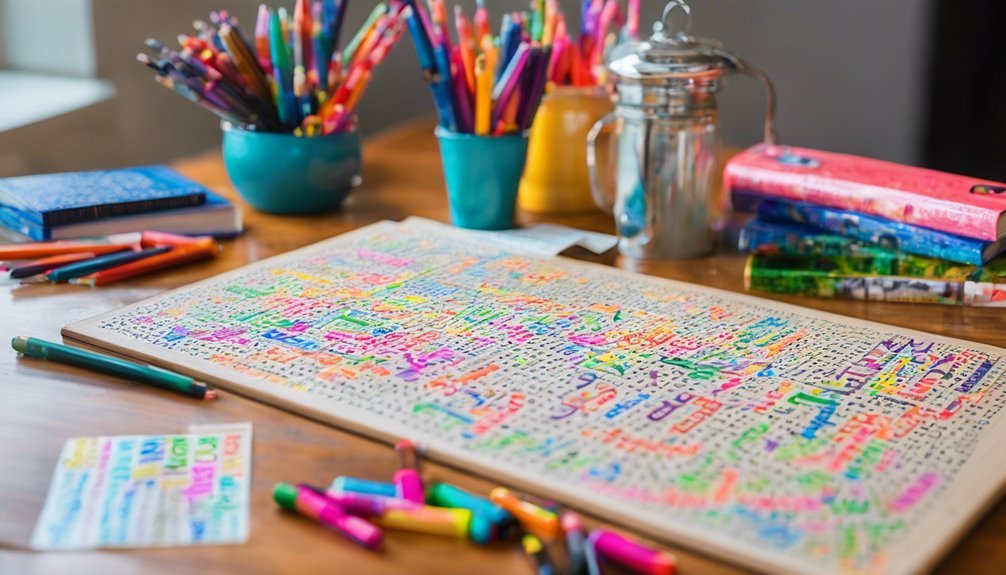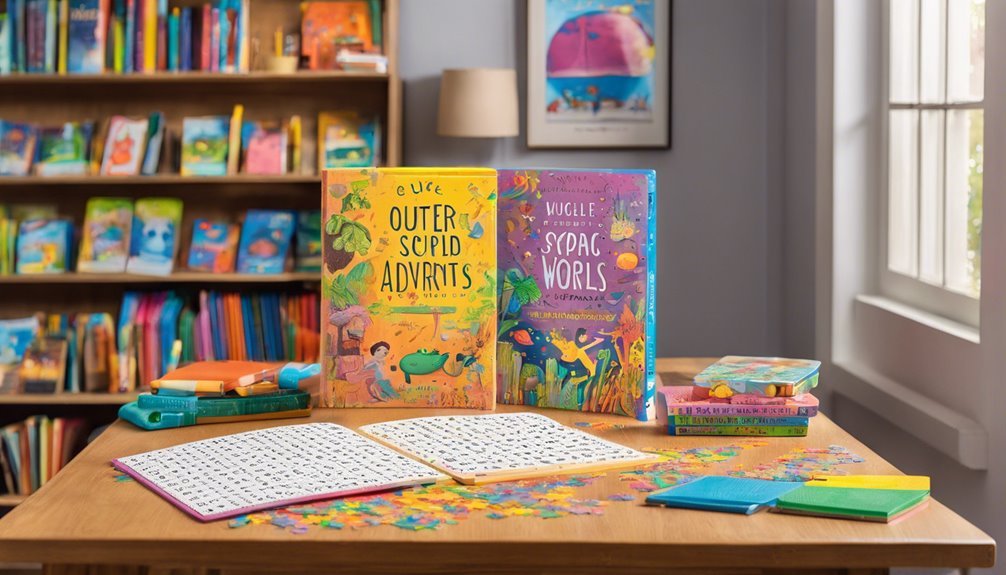"Cherishing Little Steps - A Haven for Baby and Family Journeys"
How to Make Learning Fun With Word Search Puzzle Books
You might not think of word search puzzles as a powerful learning tool, but they can transform the way students engage with new material. By incorporating fun themes and relevant vocabulary, you can make lessons stick. Plus, customizing puzzles to match current subjects enhances comprehension. Curious about how to craft the perfect puzzle or integrate them into your lesson plans? Let's explore some creative strategies that can spark excitement in your classroom.
Key Takeaways
- Incorporate themed word searches related to current subjects to make learning more relevant and engaging for students.
- Use puzzles as a fun warm-up or cool-down activity to stimulate focus and reinforce vocabulary retention.
- Create a competitive environment by organizing word search challenges, encouraging teamwork and motivation among learners.
- Tailor difficulty levels to match the learners' skills, ensuring they remain challenged yet not overwhelmed.
- Blend word searches with discussions or group activities to deepen understanding and encourage collaborative learning.
The Benefits of Word Search Puzzles in Education
While you might think of word search puzzles as just a fun pastime, they actually offer significant educational benefits. Engaging with these puzzles can enhance your cognitive development by challenging your brain to recognize patterns and recall vocabulary.
As you search for words, you're not just having fun; you're also sharpening your critical thinking skills. Each puzzle requires you to strategize, plan, and analyze, fostering stronger problem-solving abilities.
Moreover, the focus needed to complete these puzzles promotes concentration, helping you become more adept at tackling complex tasks.
Choosing the Right Word Search Puzzle Book
How do you choose the right word search puzzle book when the options seem endless? Start by considering age appropriateness. For younger learners, select books featuring larger grids and simpler themes. This will keep them engaged without overwhelming frustration.
For older students or adults, look for books that offer more challenging grids and intricate themes, enhancing critical thinking skills.
Next, assess the difficulty levels. Some books provide a range of puzzles, allowing you to gradually increase the challenge. This progression fosters mastery and maintains interest.
You'll want a balance—too easy might bore you, while too hard could lead to discouragement. By carefully evaluating these factors, you'll find the perfect word search puzzle book that makes learning both fun and rewarding!
Tips for Creating Custom Word Searches

Creating custom word searches can be a delightful way to engage learners and tailor the experience to their interests. By incorporating unique elements, you can enhance both fun and learning.
Here are some tips to consider:
- Select custom themes that resonate with your audience, like seasons, animals, or historical events.
- Vary the puzzle difficulty to cater to different skill levels, ensuring everyone feels challenged yet capable.
- Incorporate relevant vocabulary from subjects they're studying, reinforcing their learning in an enjoyable manner.
- Use creative layouts or add images to make the puzzles visually appealing and exciting.
With these strategies, you'll create word searches that not only entertain but also deepen understanding and retention!
Incorporating Word Searches Into Lesson Plans
Incorporating word searches into your lesson plans can transform routine learning into an interactive experience that captivates students. You can seamlessly integrate word searches as engagement strategies that reinforce vocabulary, spelling, or key concepts.
For instance, create puzzles based on a recent topic or unit, encouraging students to find terms related to their studies. This not only enhances retention but also fosters a fun, competitive atmosphere.
Pair the word search activity with discussions or group work to deepen understanding. Consider using them as warm-ups or cool-downs in your lessons to maintain energy and focus.
Fun Themes for Word Search Puzzles

There are countless fun themes you can explore when designing word search puzzles, each offering a unique twist that keeps learners engaged.
Consider integrating these themes to ignite curiosity:
- Holiday themes: Celebrate various traditions while searching for festive words.
- Animal themes: Dive into the animal kingdom, discovering species and habitats.
- Science themes: Explore scientific concepts, from biology to astronomy.
- Food themes: Satisfy appetites for knowledge with culinary terms and dishes.
Using Word Searches to Enhance Vocabulary
Word searches can spark a love for language and significantly enhance your vocabulary. As you hunt for words, you're not just playing a game; you're engaging with language in a dynamic way.
Each puzzle offers a unique theme, encouraging vocabulary expansion as you explore new terms. When you encounter unfamiliar words, take a moment to look them up—this boosts your retention and understanding.
Plus, the act of searching for words reinforces spelling and recognition, further deepening your language engagement. Challenge yourself with more complex puzzles to keep your brain agile and your vocabulary diverse.
Making Word Searches a Family Activity

Transforming family game night into a word search adventure can bring everyone closer together while having loads of fun.
Not only do you learn new words, but you also foster a sense of family competition and collaboration.
Here are some teamwork strategies to make your word search experience enjoyable:
- Set a time limit for added excitement.
- Encourage each family member to choose a theme for the puzzles.
- Rotate responsibilities for creating word searches.
- Celebrate victories with small rewards or recognition.
Digital vs. Print Word Search Puzzles: Which Is Better?
Have you ever wondered whether digital or print word search puzzles offer a better experience? Both formats have their unique advantages. Digital convenience allows you to play anytime, anywhere, often with hints and timers to enhance the challenge. On the other hand, print nostalgia brings a tactile joy, as you feel the page beneath your fingers and can share a physical book with friends and family.
Here's a quick comparison:
| Aspect | Digital Convenience | Print Nostalgia |
|---|---|---|
| Accessibility | Always available | Requires a book |
| Interaction | Click and highlight | Pen and paper |
| Social Sharing | Easy sharing online | Bonding over pages |
| Customization | Various themes | Limited to book |
| Eye Comfort | Screen glare | No screens involved |
Ultimately, the choice depends on your personal preference!
Frequently Asked Questions
Can Word Searches Improve Critical Thinking Skills in Students?
Absolutely, word searches can boost your critical thinking skills!
When you engage with these puzzles, you sharpen your cognitive development by seeking patterns and connections among letters. It encourages you to think strategically as you navigate through the challenges, enhancing your problem-solving abilities.
Plus, the focus required to find words fosters concentration, which is crucial for analytical thinking.
What Age Groups Benefit Most From Word Search Puzzles?
Imagine diving into a sea of letters, where each word you find is a treasure for your mind!
Word search puzzles work wonders for cognitive development, especially for children aged 5 to 12. They challenge young minds while being age-appropriate, enhancing vocabulary and pattern recognition.
Even adults can benefit, sharpening their mental acuity.
How Long Should a Word Search Puzzle Take to Complete?
When you tackle a word search puzzle, completion time can vary greatly based on the puzzle's difficulty.
If you're working on an easy puzzle, you might finish it in just a few minutes. However, a more challenging one could take 20 minutes or longer.
It's all about finding the right balance that keeps you engaged without feeling overwhelmed.
Are There Any Educational Apps for Creating Word Searches?
Ever wondered how you can merge fun with learning?
There are several educational apps designed specifically for puzzle creation, allowing you to craft your own word searches.
Apps like "Word Search Creator" and "Discovery Education's Puzzle Maker" transform learning into an engaging game.
With these tools, you can create customized word puzzles that reinforce concepts, making educational games not just entertaining but also effective.
Dive in and unleash your creativity!
Can Word Search Puzzles Be Used for Language Learning?
Absolutely, you can use word search puzzles for language learning!
They're a fantastic way to boost vocabulary enhancement and aid language retention. As you search for words, you're actively engaging with the language, reinforcing your memory of terms.
Plus, you'll discover new words in a fun, interactive way. By regularly incorporating these puzzles into your study routine, you'll find yourself mastering vocabulary more effectively and enjoying the learning process at the same time!
Conclusion
Incorporating word search puzzles into your learning routine can transform education into an adventure. Why settle for boring drills when you can make vocabulary building exciting? By customizing puzzles, choosing engaging themes, and involving family or classmates, you're not just enhancing retention—you're creating memorable experiences. So grab a puzzle book, and watch as learning becomes a fun-filled journey that sparks curiosity and collaboration. Let the search for knowledge begin!

